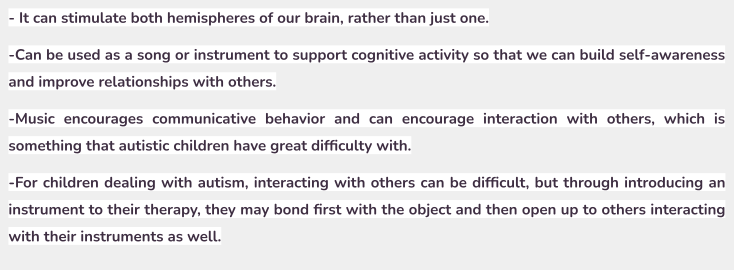What is Music Therapy ?

- By Somaiyya Jawaid Posted On - 25/05/2021
Music therapy is a well-implemented and free of any risk technique which utilises musical interaction to assist those individuals who suffer a wide domain of cognitive and emotional difficulties and aims at improving their ability to function.
By having an interaction with adults and children who are on the autism spectrum, musical therapists can establish skills, help them in lowering their anxiety, and even help them to develop new communication skills.
“Almost all children respond to music. Music is an open-sesame, and if you can use it carefully and appropriately, you can reach that child’s potential for development.”
This was quoted by Dr. Clive Robbins who was a British music therapist, and an educator in special needs. Individuals who are on the autism spectrum are most often interested in and responsive to music.
Since Music is motivational and that establishes engagement, it may be employed as a natural "reinforcer" for getting the desired responses.
Music therapy can also aid those who have sensory disinclinations to typical voices that helps in coping with sound sensitivities or individual variations when it comes to auditory processing.
It assists children with autism to improve skills in domains such as behavior, cognition, perceptual/motor skills, communication, social skills, sensory issues, and self-reliance or self-determination.
The therapeutic process finds music experiences which strikes a chord with a specific person, making personal connections and building trust.
PREVIOUS STUDIES
Studies of early intervention have indicated that when learning together with autistic children through gentle play, non-invasive games and fun musical activities, this creates an environment which is supportive for parents and children and guides in building bonds in a healthy way.
The reason that music therapy is to support our autistic children is to learn to relate to us and to others; and other family members can as well be invited to participate after children become habitual to one on one sessions.
Apart from the sensory of dance, verbal advancement of lyrics and the social dynamics of learning a tool, rhythm can assist to motivate an impulsive play time which involves our entire brains and body as one.
WHAT HAPPENS IN MUSIC THERAPY
After evaluating the strengths and requirements of each person, music therapists build up a treatment plan with goals and objectives which offers appropriate treatment. The therapy session can be conducted with one individual as well as in small groups, employing a wide array of music and techniques.
EFFECTIVENESS
